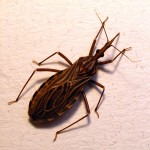Chagas disease led to demise of evolution pioneer Charles Darwin
Chagas disease was likely the condition that killed English naturalist Charles Darwin according to a group of health experts who have been holding an annual conference about the mysterious ailments of notable historical figures.
Darwin, most famous for his travels around the world aboard the HMS Beagle and his groundbreaking work "On The Origin of Species", also suffered from multiple other conditions aside from Chagas disease.
According to Dr. Sidney Cohen, a gastroenterologist and professor at Thomas Jefferson University and researcher of the scientist's ailments, Darwin likely also had cyclic vomiting syndrome characterized by belching stomach acid rather than food.
"One illness did not explain his ailments," Dr. Cohen said. "There were symptoms all over the place. Putting it all together over his lifetime with multiple illnesses made it work."
Darwin contracted Chagas disease in Argentina where he was bitten by a blood-sucking assassin bug called triatomid, a known vector of the protozoan parasite that causes the condition.
The naturalist's own account of developing a fever after being bitten by the insect and an asymptomatic period prior to severe complications of heart disease and gastrointestinal problems such as peptic ulcer in later years, are also characteristic of Chagas disease.
The famed naturalist traveled to different countries to catalog and examine wildlife and fossils. He later formulated the theory of natural selection to explain the origin and diversity of life on Earth.
At the conference sponsored by the University of Maryland School of Medicine in Baltimore, Darwin's great-great-granddaughter talked about his famous grandparent's experience of being bitten by the insect and his bout with symptoms of the then-unknown Chagas disease.
